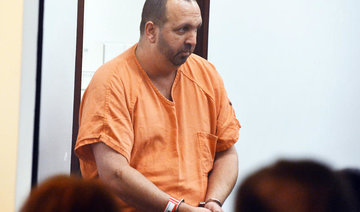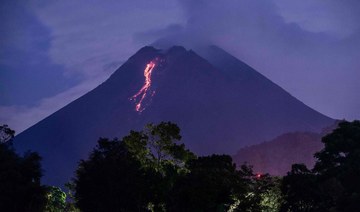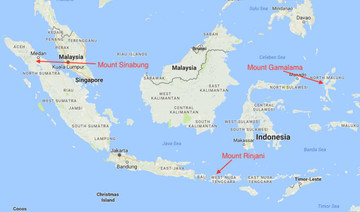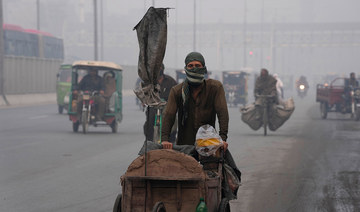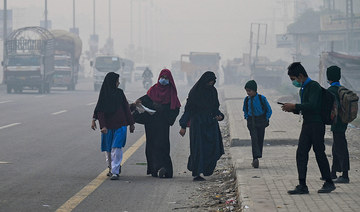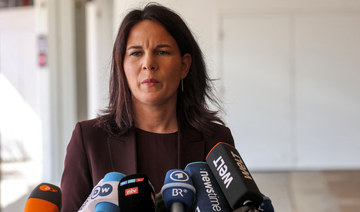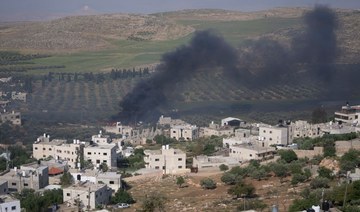NORTH CAROLINA: Moments after a North Carolina man pleaded guilty to gunning down three Muslim university students, a prosecutor played a cellphone video of the slayings in the courtroom Wednesday as one of the victims’ relatives fainted, others wept openly and a man hurled an expletive at the confessed killer.
Craig Stephen Hicks, 50, entered the plea to three counts of first-degree murder in a packed Durham courtroom. It came two months after incoming District Attorney Satana Deberry dropped plans to seek the death penalty in hopes of concluding a case that she said had languished too long.
“I’ve wanted to plead guilty since day one,” Hicks told Superior Court Judge Orlando Hudson. The judge said Hicks had agreed as part of his plea to accept three consecutive life sentences without parole and 64 to 89 months for the crime of discharging a gun into a building.
Police say that in February 2015, Hicks burst into a condo in Chapel Hill owned by 23-year-old Deah Barakat and fatally shot Barakat, his wife, Yusor Abu-Salha, 21; and her 19-year-old sister Razan Abu-Salha.
At the time of the shootings, Chapel Hill police said Hicks claimed he was provoked by competition over parking spaces at the condo complex. Relatives of the victims said their family members were targeted because they were Muslim, and they asked federal authorities to pursue hate-crime charges. Authorities later indicated they did not have sufficient evidence to successfully prosecute Hicks on those charges.
Moments after Hicks’ entered his plea, Assistant District Attorney Kendra Montgomery-Blinn played a cellphone video of the slayings as the victims’ parents and siblings watched from the front row. At one point, Barakat’s older sister, Dr. Suzanne Barakat, fainted. She later appeared at a news conference with other family members and an attorney said she was OK.
Women wept openly and a young man hurled an expletive at Hicks after watching the video, shown on a large pull-down screen and on two flat-screen televisions that were used to give people in the courtroom a better view. The prosecutor also showed a video of Hicks’ confession and a series of still photos portraying happy moments in the victims’ lives.
Montgomery-Blinn said Deah Barakat had turned on his phone’s video to capture an exchange with Hicks, who she said was often seething during his previous encounters with the victims.
The video shows Hicks complaining that Barakat and the Abu-Salha sisters are using three parking spaces. When Barakat responds that they’re not taking any more spaces than condo rules allow, Hicks pulls a gun from his holster and fires several times.
The phone drops to the floor inside the front door, the sounds of women screaming can be heard, and then several more shots are heard.
“In 36 seconds, Mr. Hicks executed three people,” Montgomery-Blinn said.
Barakat was shot several times as he stood in his doorway, autopsy results showed. His wife and her sister were shot in the head at close range inside the condo.
Barakat, a dental student at the University of North Carolina-Chapel Hill, and Yusor Abu-Salha had been married for less than two months, and she had just been accepted to the dental school. Razan had just made the dean’s list in her first semester at North Carolina State University. All three were making plans to visit Turkey during their coming summer break to volunteer in a dental clinic at a camp for Syrian war refugees.
The victims’ families and Muslim advocacy groups had asked federal authorities to pursue hate-crimes charges against Hicks. Joe Cheshire, a prominent defense attorney who has been working with the victims’ families and guiding them through the legal process over the past four years, said at a news conference after the plea hearing that authorities could not discount Hicks’ initial explanation that the violence was provoked by a parking space dispute. He said they could not satisfy themselves that his actions met all the required conditions of bringing a successful hate crime prosecution.
Cheshire said the families were not happy with the decision.
“It hurt a lot of feelings and it added to the false narrative,” he said. “Our government failed this family and our multicultural democracy.”
During the hearing, Hicks listened attentively as Montgomery-Blinn described him as a man who was watching the American Dream slip away while the victims were pursuing it. She said Hicks’ third marriage was disintegrating and he’d recently quit his job in anger after workers described him as constantly playing computer sniper games.
“The defendant was an angry and bitter man,” Montgomery-Blinn said.
3 life sentences without parole for US man who killed 3 Muslims in 2015
3 life sentences without parole for US man who killed 3 Muslims in 2015
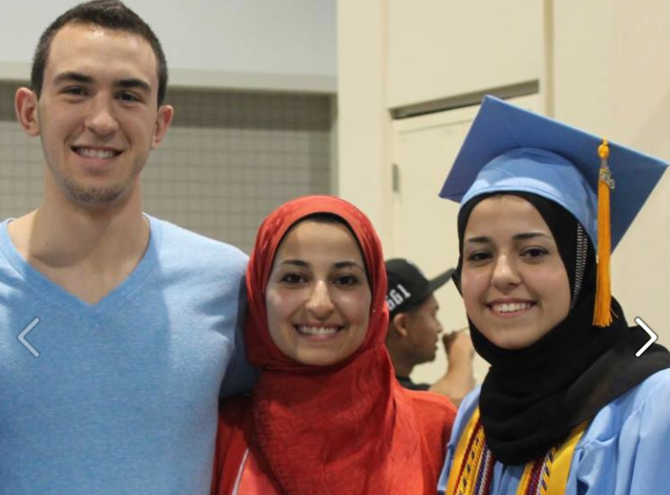
- Craig Stephen Hicks, 50, pleaded guilty to three counts of first-degree murder
- Relatives say Deah Barakat, his wife, Yusor Abu-Salha,and her sister Razan Abu-Salha were killed in 2015 because of their religion
Hundreds of people evacuated as volcano spews clouds of ash in Indonesia
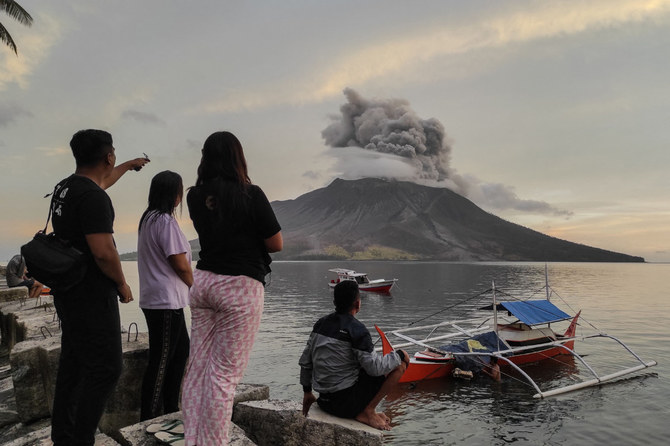
- Local authorities combed the villages surrounding the volcano and evacuated residents to safer areas by boat
- Officials worry that part of the volcano could collapse into the sea and cause a tsunami, as happened in an eruption there in 1871
MANADO, Indonesia: More than 2,100 people living near an erupting volcano on Indonesia’s Sulawesi Island were evacuated Friday due to the dangers of spreading ash, falling rocks, hot volcanic clouds and the possibility of a tsunami.
Indonesia’s Center for Volcanology and Geological Hazard Mitigation recorded at least three eruptions since Friday afternoon, with the maximum height of the eruption column reaching 1,200 meters (3,900 feet).
An international airport in Manado city, less than 100 kilometers (60 miles) from the erupting Mount Ruang, is still temporarily closed as volcanic ash was spewed into the air.
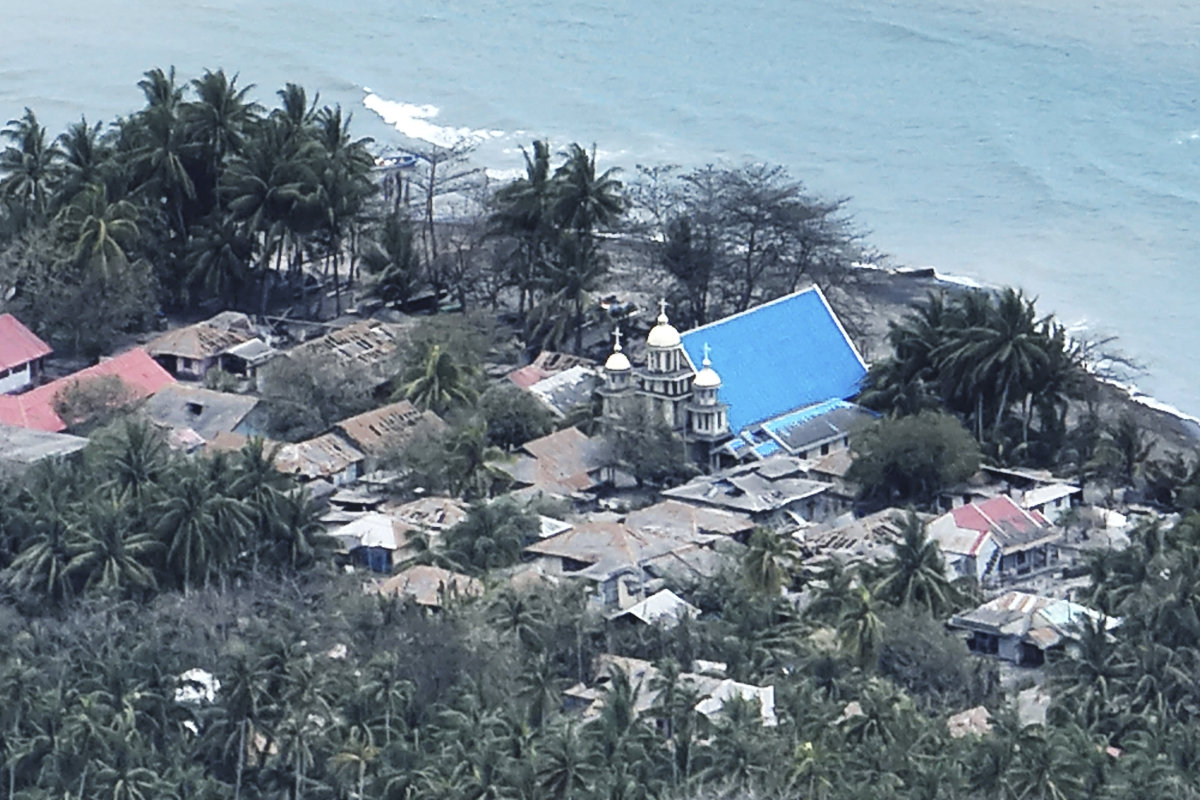
Satellite imagery from the Meteorology, Climatology and Geophysics Agency shows the ash has spread to the west, northwest, northeast and southeast, covering Manado and North Minahasa, according to a statement from Indonesia’s Transportation Ministry.
“We are still monitoring developments in the eruption of Mount Ruang and coordinating with relevant stakeholders … to anticipate the necessary actions to ensure flight safety, security and comfort,” said Ambar Suryoko, head of the regional airport authority.
More than 11,000 people were told to leave their homes that were located in the affected area. A joint team from the local authorities combed the villages surrounding the volcano and evacuated residents to safer areas by boat.
Officials worry that part of the volcano could collapse into the sea and cause a tsunami, as happened in an eruption there in 1871.
Houses, roads and other buildings were covered by gray volcanic ash, and many roofs were broken by debris spewed from the eruption.

Mount Ruang saw at least five large eruptions Wednesday, causing the Center for Volcanology and Geological Hazard Mitigation to issue its highest level of alert. People were ordered to stay at least 6 kilometers (3.7 miles) from the 725-meter (2,378-foot) mountain.
The observation from the agency on Friday said white smoke was rising from the main crater with medium to thick intensity.
East of the volcano, Tagulandang Island could be at risk if a collapse occurred. Its residents were among those being told to evacuate. Indonesia’s National Disaster Mitigation Agency said residents would be relocated to Manado, a journey of 6 hours by boat.
Indonesia, an archipelago of 270 million people, has 120 active volcanoes. It is prone to volcanic activity because it sits along the “Ring of Fire,” a horseshoe-shaped series of seismic fault lines around the Pacific Ocean.
Finance firms urge ambitious action on plastic pollution

- Curtailing the estimated 400 million metric tonnes of waste produced every year is a crucial part of efforts to protect biodiversity, with microplastics found everywhere from the mountainous Himalayas to staple foods and even human blood
LONDON: A group of 160 financial companies on Friday urged governments to agree a treaty to end plastic pollution that would help spur private sector action, ahead of the next round of global talks in Canada.
The fourth meeting of the Intergovernmental Negotiating Committee on Plastic Pollution (INC-4) is due to be held in Ottawa next week to lay the groundwork for an eventual deal before the end of the year.
Curtailing the estimated 400 million metric tonnes of waste produced every year is a crucial part of efforts to protect biodiversity, with microplastics found everywhere from the mountainous Himalayas to staple foods and even human blood.
To help fix the problem, the finance firms, which include Britain’s biggest investor Legal & General Investment Management and Canadian pension investor CDPQ, called for a policy framework backed up by binding rules.
Among specific steps, the group called for the treaty to set an objective for all public and private finance to be consistent with the goal of eliminating plastic pollution, similar to that in the Paris climate agreement and the Kunming-Montreal global biodiversity framework.
It also called for companies to assess and disclose plastic-related risks and opportunities; clearer plastic-related policies and targets from governments in areas like waste creating and recycling; and for further private investment to be directed to ending plastic pollution.
“A clear transition pathway laid out in the Treaty will help leverage finance at scale for this massive task of ending plastic pollution worldwide,” said Anne-Sophie Castelnau, global head of sustainability at ING, one of the signatories.
Steve Hardman, CEO of Plastic Collective, an NGO which designed the world’s first plastic waste reduction bond alongside Citi and the World Bank, welcomed the support but called for business to provide more financial solutions.
In January, the World Bank issued the $100 million bond to finance plastic-reduction projects in Ghana and Indonesia. Investors will be paid a rate linked to plastic removal credits generated by the projects.
Finnish PM: EU should help end migrant influx from Russia

- European Commission President Ursula von der Leyen visits the border to assess security situation
HELSINKI: The EU should take measures to help Finland stop an influx of migrants via Russia, Finnish Prime Minister Petteri Orpo said.
Finland last year shut its long border with Russia amid a growing number of arrivals from countries including Syria and Somalia.
It accused Moscow of weaponizing migration against the Nordic nation and the EU, an assertion the Kremlin denies.
Finland’s government has closed eight of its nine checkpoints with Russia.
The only one that remains open is dedicated to rail travel and cargo trains mainly run through it.
“We are preparing our legislation, but we also need EU measures,” Orpo said, without elaborating, after visiting the Nordic country’s border with European Commission President Ursula von der Leyen.
Von der Leyen told the same press conference that the EU Commission was working closely with the migrants’ countries of origin, agreeing with Finland’s position.
“What we see is that a state is instrumentalizing poor people to put pressure on another state, so that is a clear security issue,” she said.
She said that the measures taken to deal with migrants from Russia must balance protecting the security of borders and international obligations.
Following Poland and Lithuania’s example on their borders with Belarus, the Finnish government is drafting legislation allowing border guards to block asylum seekers entering the country from Russia.
“We all know how (Russian President Vladimir) Putin and his allies instrumentalize migrants to test our defenses and to try to destabilize us,” von der Leyen told officials.
“Now Putin is focusing on Finland, and this is no doubt in response to your firm support of Ukraine and your accession to NATO.”
Von der Leyen and Orpo flew in a Finnish helicopter over the landscape of forests and towns on the border.
Von der Leyen is campaigning as a conservative European People’s Party bloc member for a second term in office as head of the EU’s powerful executive branch.
Security is a top EPP theme before the June 6-9 European Parliament elections.
Most of the migrants hail from the Middle East and Africa.
Most of them have sought asylum in Finland, a member of the EU and NATO with a population of 5.6 million.
Finland joined NATO in April 2023, ending decades of neutrality after the country’s defeat by the Soviet Union in the Second World War.
In March, Sweden also became a member of the trans-Atlantic alliance.
The move dealt a major blow to Putin, with a historic realignment of Europe’s post-Cold War security landscape triggered by Moscow’s offensive against Ukraine.
US sanctions ally of Israeli minister, entities backing ‘extremist’ settlers
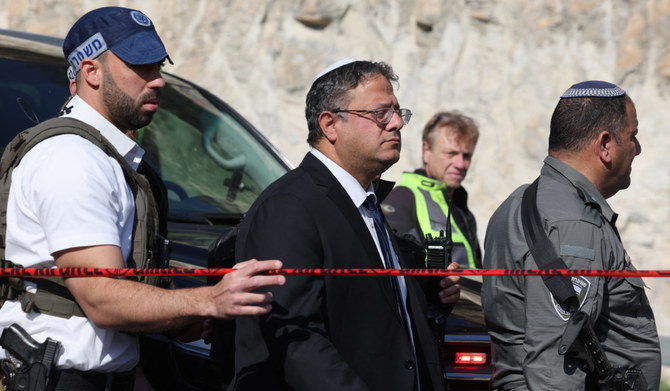
- Move comes as West Bank sees some of its worst violence perpetrated by settlers against Palestinians since Gaza war
WASHINGTON: The United States on Friday imposed sanctions on an ally of Israel’s far-right national security minister and two entities that raised money for Israeli men accused of settler violence, the latest actions aimed against those Washington blames for an escalation of violence in the Israeli-occupied West Bank.
The sanctions, in addition to those already imposed on five settlers and two unauthorized outposts already this year, are the latest sign of growing US frustration with the policies of Israeli Prime Minister Benjamin Netanyahu.
The moves on Friday, which freeze any US assets held by those targeted and generally bar Americans from dealing with them, hit two organizations that launched fundraising campaigns to support settlers accused of violence and targeted by previous sanctions, the Department of the Treasury said in a statement.
The Biden administration’s moves against Israeli settlers have upset right-wing members of Netanyahu’s governing coalition who support the expansion of Jewish settlements and ultimately the annexation of the West Bank, where Palestinians envisage a future state.
They come as the complex relationship between Washington and its ally Israel is tested by the war in Gaza and as the Biden administration urges Israel to show restraint in responding to retaliatory strikes by Iran.
Washington sanctioned Ben-Zion Gopstein, founder and leader of the right-wing group Lehava, which opposes Jewish assimilation with non-Jews and agitates against Arabs in the name of religion and national security. Gopstein has said Lehava has 5,000 members.
State Department spokesperson Matthew Miller said members of the group had engaged in “destabilizing violence affecting the West Bank.”
“Under Gopstein’s leadership, Lehava and its members have been involved in acts or threats of violence against Palestinians, often targeting sensitive or volatile areas,” Miller said in a statement, warning of additional steps if Israel does not take measures to prevent extremist attacks amid an escalation of violence in the West Bank in recent days.
The European Union also said on Friday it had agreed to take sanctions against Lehava and other groups linked to violent settlers.
A spokesperson for Israel’s embassy in Washington did not immediately respond to a request for comment.
Gopstein, the most prominent Israeli figure targeted by US sanctions, is a close associate of and has family ties to National Security Minister Itamar Ben-Gvir, who himself lives in a West Bank settlement.
Ben-Gvir, like Gopstein, was a disciple of the late Meir Kahane, an ultranationalist rabbi whose Kach movement was listed by Washington as a specially designated global terrorist organization.
Ben-Gvir on Friday slammed what he called harassment against Lehava and “our dear settlers who have never engaged in terrorism or hurt anyone,” labeling the allegations against them a “blood libel” by Palestinian groups and anarchists.
“I call on Western countries to stop cooperating with these antisemites and end this campaign of persecution against the pioneering Zionist settlers,” Ben-Gvir said in a statement released by his office.
CROWDFUNDING
Since the 1967 Middle East war, Israel has occupied the West Bank of the Jordan River, which Palestinians want as the core of an independent state. It has built Jewish settlements there that most countries deem illegal. Israel disputes this and cites historical and Biblical ties to the land.
The Biden administration in February said settlements were inconsistent with international law, signaling a return to long-standing US policy on the issue that had been reversed by the previous administration of Donald Trump.
One entity targeted on Friday, Mount Hebron Fund, launched an online fundraising campaign that raised $140,000 for settler Yinon Levi, the Treasury said, after he was sanctioned on Feb. 1 for leading a group of settlers that assaulted Palestinian and Bedouin civilians, burned their fields and destroyed their property.
It said the second entity, Shlom Asiraich, raised $31,000 on a crowdfunding website for David Chai Chasdai, who the United States sanctioned for initiating and leading a riot that included setting vehicles and buildings on fire and causing damage to property in the Palestinian town of Hawara, resulting in the death of a Palestinian civilian.
“These types of enforcement actions against entities helping violent settlers evade US sanctions are what give sanctions teeth,” said Michael Schaeffer Omer-Man, director of research for Israel-Palestine at Democracy for the Arab World Now, a human rights group that has highlighted efforts by supporters to evade sanctions against settlers.
Hindu-Muslim divisions sway voting in Indian district scarred by deadly riots

- Villages are largely self-segregated by religion in and around Muzaffarnagar in the most populous Uttar Pradesh state
- Violent clashes broke out in 2013 after two Hindus stabbed Muslim youth to death, accusing him of harassing their sister
MUZAFFARNAGAR: Hindu-Muslim enmity made way for peace in an Indian district that saw deadly riots a decade ago but religious divisions still influence residents who voted on Friday in general elections in which Hindu nationalism is a key theme.
Villages are largely self-segregated by religion in and around Muzaffarnagar district, in the most populous northern state of Uttar Pradesh, but people say there is no longer tension between the majority Hindu and minority Muslim communities.
Violent clashes broke out here in 2013 after two Hindus stabbed a Muslim youth to death, accusing him of sexually harassing their sister. They were later beaten to death by a Muslim mob, which sparked riots that killed about 65 people, mostly Muslims, and displaced thousands.
Violence has not returned to the district known as the country's sugarcane-belt, but political divisions remain as Hindus typically vote for Prime Minister Narendra Modi's Bharatiya Janata Party (BJP) and Muslims for the opposition.
Modi's government has "controlled Muslims", said Ramesh Chand, a Hindu biscuit baker in Kairana city near Muzaffarnagar.
Critics accuse the nationalist BJP of targeting India's 200 million minority Muslims to please their hardline Hindu base - charges they deny.
Modi is widely expected to win a third term on the back of strong growth, welfare and his personal popularity despite some concern about unemployment, price rises and rural distress.
Chand said Modi had improved security in the region. "We can live in peace, whether or not we have jobs ... We can sleep with our doors open."
There were opposing views too.
In Jaula village, sugarcane farmer Mohammed Irfan, 50, said Modi's "high-handedness against Muslims" as well as unemployment and inflation were major reasons for him voting for the opposition Samajwadi Party.
Uttar Pradesh elects 80 lawmakers to the 543-member lower house of parliament, the most among all states, and a strong showing here is critical to the nationwide outcome.
Support for Modi was visible in Kutba Kutbi village, the epicentre of the 2013 riots.
Although there is "brotherhood" between the two communities now, nearly all Muslim families left the village after the riots, said Vinay Kumar Baliyan, 43, a farmer who said he supports Modi for promoting economic growth and raising India's stature globally.
But Irfan said Muslims are expected to vote in larger numbers this time as Eid celebrations this month brought many migrant workers and students home.






